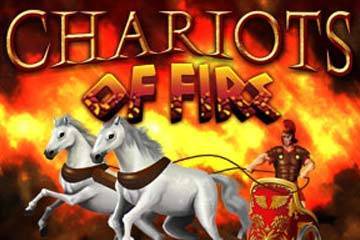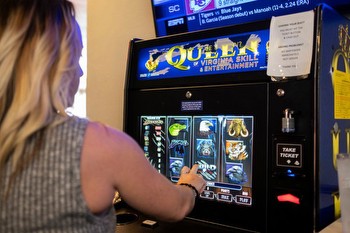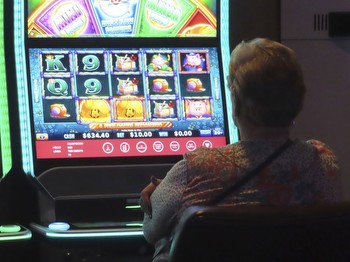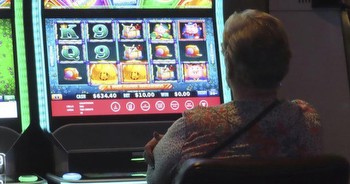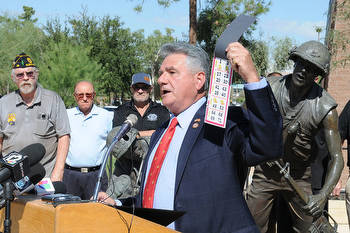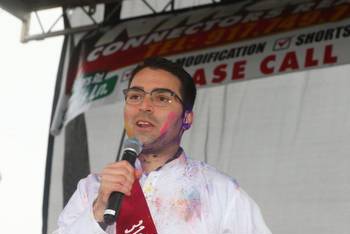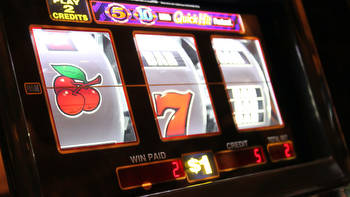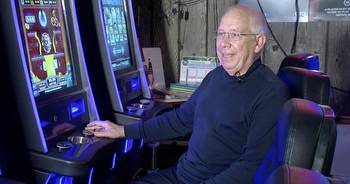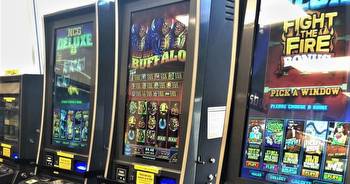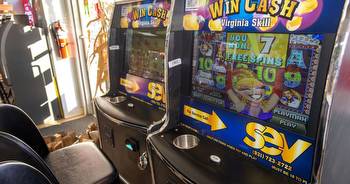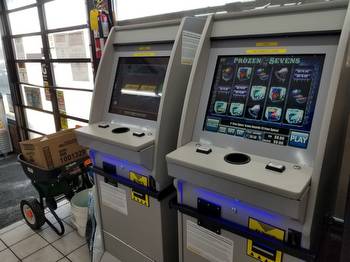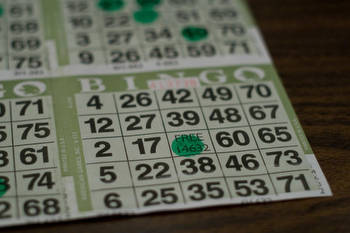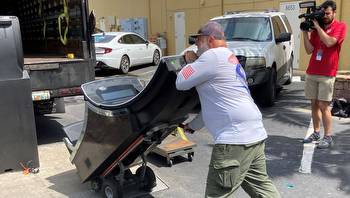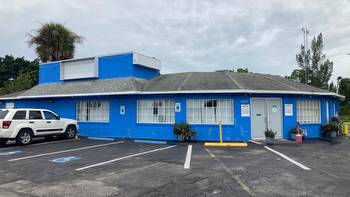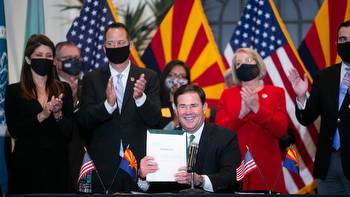Sen. Sonny Borrelli battles Arizona regulators over electronic bingo
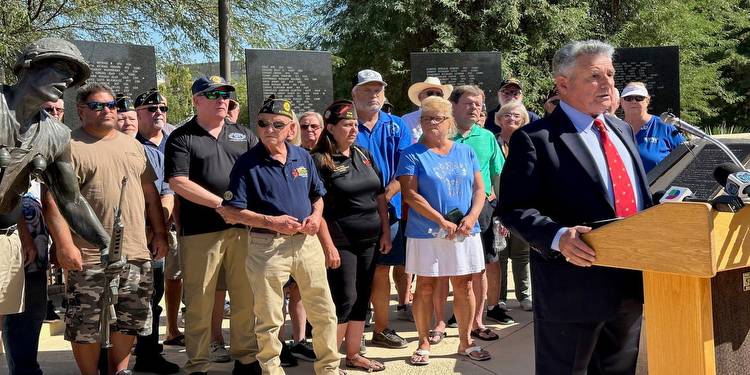
Arizona regulators are cracking down on what they say are illegal slot machines being billed as bingo games used at nonprofits, small businesses and veterans' organizations around the state.
Since Sept. 1, 17 of those facilities have been inspected by employees of the Arizona Department of Gaming, which helps enforce state gambling laws, and the Arizona Department of Revenue, which licenses bingo operators.
After those inspections, regulators worked with bingo game operators to come into compliance, according to the Department of Revenue.
That action has sparked a political dispute over bingo technology and what types of machines are allowed to be used when playing the game, with a Republican senator accusing Gov. Katie Hobbs’ administration of conducting raids to harass organizations that support veterans.
Sen. Sonny Borrelli, R-Lake Havasu City, appeared with about 40 members of the veterans' community at the Vietnam War Veterans Memorial at Wesley Bolin Plaza Monday, calling the state's latest actions as "big-government tyranny."
The electronic bingo machines have been the lifeblood for veterans' groups, but they're being hassled because of "simple modifications" to the way bingo has been played legally in Arizona since 1954, he said.
The way he described it, "heavy-handed" state agents with the departments of Gaming, Revenue and Liquor Licenses and Control have been going into the nonprofit facilities, "flashing badges, freaking out bartenders" about possible criminal prosecution or liquor-license revocation, he said. "It's ridiculous."
In a statement before the event, Borrelli accused state employees of "sacrificing Arizona's veterans" to appease the tribal gaming industry. A letter he sent to the three agencies earlier this month demands that they use their rule-making ability to change state policy in a way that allows the machines.
With the legality of the machines in question, legal problems for the veterans' groups are not just a theory.
Greg Mullally, the gambling consultant who's been working with Borrelli for years to bring bingo machines to the groups, is fighting a multi-count felony prosecution related to their distribution of the machines.
State: 'What we are actually doing is protecting Arizonans'
While in-person bingo games are allowed in Arizona after obtaining a license, using machines to play the game are illegal, according to the Department of Gaming. Just one type of machine, a bingo technological aid that simulates a bingo card and is meant to aid people with disabilities, is legal, according to the department.
Hobbs said it is the state’s job to enforce those laws. Her administration sent a letter to bingo licensees on Sept. 1 about the laws, and what was not allowed, before conducting inspections.
“These machines are breaking the law, that's very clear," she said. “We're doing our job.”
On Monday, state officials responded to Borrelli’s allegation that the Hobbs administration was prioritizing tribal gaming rights over those of veterans’ organizations. The letter was signed by Jackie Johnson, executive deputy director of the Arizona Department of Gaming; Ben Henry, director of the Department of Liquor Licenses and Control; and Rob Woods, director of the Arizona Department of Revenue.
“That allegation is as incorrect as it is offensive," the letter reads. “What we are actually doing is protecting Arizonans, including veterans and seniors, from unregulated, potentially predatory gambling machines that are not properly audited or monitored, which is our statutory mandate.”
Hobbs’ administration says Borrelli is torturing the interpretation of a 2017 law that allowed some technology to be used by bingo players.
2017 law creates confusion over electronic bingo machines
Borrelli said he's been working with Lynxx Gaming CEO Greg Mullally since at least 2017 on how enhanced bingo games could help veterans' nonprofit groups. The talks resulted in a 2017 law that made it clear "technological aids" could be used to make bingo playing more compliant with the American Disabilities Act.
For example, some players have trouble marking bingo cards or calling out "Bingo!" when their numbers match a preselected group of numbers. And as Borrelli told a Senate hearing panel that year, the goal was to make sure such organizations "don't get sued" for not being ADA-compliant.
After the law passed, Mullally's Tempe-based company began selling or leasing electronic bingo machines to local charitable groups, including veterans' organizations. The departments of Gaming and Revenue under former Gov. Doug Ducey's administration viewed the new machines as illegal and too similar to slot machines under state law and contrary to the state's tribal gaming compacts, which legalize Las Vegas-style gambling only for Native American tribes.
The Gaming Department put out a warning in 2017 about the law's passage, highlighting that "possession of a bingo gambling device remains a crime" and that providers of gaming devices might be confused, too.
The department's warning describes how bingo requires numbers to be drawn "from a receptacle" at the facility where the game is played, that the results must be "called out to players" and that players win by obtaining the same pattern or sequence of numbers on a bingo card.
The electronic bingo machines used by the facilities don't play what Borrelli called "grandma's bingo," in which numbers are called out one-by-one as players with numbered cards see if they have a match. Instead, they use a "bonanza bingo"-style in which the winning numbers are pre-chosen in bulk and input into the machines.
The method allows for instant winnings but, according to Borrelli, still adheres to state rules for how bingo must be played. But some work-arounds are still needed. Borrelli said Monday that the facilities using the machines will typically draw numbers in the morning and input them into the machines, allowing people to play throughout the day without other draws being needed.
Bingo machines bring in money, veterans say
Several veterans leaders said the machines have increased their revenue substantially.
Steve Van Bergen, commander for VFW Post 7968 in Apache Junction, said that after his group installed three of the machines in 2020, revenue increased by about 30% over what it had made on traditional bingo games. The VFW post can spend its earnings only for reimbursement of utility costs and to provide subsistence aid to veterans or other community members, he said.
But the idea ultimately ran afoul with the law, resulting in multiple raids in 2020.
A tactical team raided American Legion Post 61 in Avondale that year, removing all of its bingo machines, said the post's commander, Ron Ross.
"They came out with a SWAT team and yanked everything out," Ross said. "The court determined that these things were not illegal. So, we put 'em all back in."
Revenue from the machines helped provide 150 backpacks full of school supplies in four area school districts, he said, adding, "I really appreciate that we had those games, and I'm wishing people would leave us alone."
Although the machines were returned, courts have not ruled on the machines' legal status. The seizures had not complied with a 2021 law that requires prosecutors to obtain a conviction before they can forfeit property related to a criminal case.
A pending criminal case against Mullally and three other men looks likely to settle the question.
Electronic bingo entrepreneur indicted, faces trial
Mullally, who lives in Lake Havasu City and has been in the gaming business for more than four decades, was indicted in August 2022 on charges related to the machines, then re-indicted in March on one felony count of illegal control of an enterprise and 12 counts of managing or financing gambling. Three other men, Randall Leonard, Frank William Meyer and Russell Anthony Pandina II, are also accused in the case.
Mullally didn't return phone messages. He told the Herald/Review newspaper in July that 300 machines worth about $15,000 each were confiscated around the state in the 2020 raid.
The Maricopa County Attorney's Office is operating under the premise that the machines are illegal. In August, Mullally lost a bid to remand the case back to the grand jury for a second time.
"While defendants made it clear that it was their goal to create a product that did not violate state law, they proceeded with that product creation and use without first ensuring that it met state law," Judge Bruce Cohen wrote in rejecting the remand request.
"If the State did not specifically approve the product, any action taken by Defendants was at their own risk."
A trial date in the criminal case was tentatively set for Feb. 8.
Borrelli said the state's erroneous position can be seen in its letter Monday, which displays a photo of several machines that are "functionally identical to slot machines," but which Borrelli said are not state-compliant bingo machines.
The Lynxx machines may have displays that resemble slot machines, but "that's the illusion," he said. "You're still playing freaking bingo."
Reach reporter Stacey Barchenger at stacey.barchenger@arizonarepublic.com or 480-416-5669. Follow her on X @sbarchenger.







